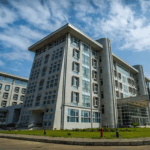
President of the Ghana Association of Banks, John Awuah, says banks have begun engaging the Ministry of Foreign Affairs to deal with cases of loan defaults by some medical professionals.
The doctors, he said, migrated abroad after securing personal loans from local banks.
Speaking on Joy News’ PM Business Edition with George Wiafe, Mr Awuah disclosed that some doctors who relocate to work in other countries take loans and abandon repayment after leaving Ghana.
“There are processes we are going through with the Ministry of Foreign Affairs to contact the diplomatic corps since you don’t just wake up and write to them,” he said.
“We’ve already started; there’s a letter that is logged at the Ministry of Foreign Affairs, which is trying to achieve that, but that is a reactive mechanism.”
He explained that the issue has become a growing concern within the banking industry, noting that these professionals often obtain personal loans using their bank statements before leaving the country.
“They have bank accounts. They use your bank statements. They have personal loans. The bank will not ask you exactly what you are going to buy since it is a personal loan,” he said.
“They will come to a bank, take like, let’s say, GH¢120,000 or GH¢150,000, take a visa and jump off and leave the loan hanging.”
Mr Awuah expressed concern that such actions undermine confidence and increase the level of non-performing loans (NPLs) in the system.
“Wherever they are going, they are working there and earning, and one would think that as medical practitioners, they will just say, ‘I have a liability in Ghana, which enabled me to demonstrate that I can fund my travel, so let me come and settle,’” he said.
He described the trend as disappointing, particularly because it involves individuals who are generally regarded with moral integrity.
“About 70% of them are not paying. These are medical doctors, people we hold in high esteem,” he lamented.
According to him, the industry had even considered engaging embassies to require visa applicants to obtain clearance from banks before approval, but this had to be done through formal diplomatic channels.
“At some point, we were even attempting to write to the embassies to seek clearance from banks before they would allow visa processes to go through,” he revealed.
Mr Awuah said banks are hopeful that, with support from the Ministry of Foreign Affairs, mechanisms can be established to ensure that borrowers who relocate abroad continue to honour their financial obligations in Ghana.



